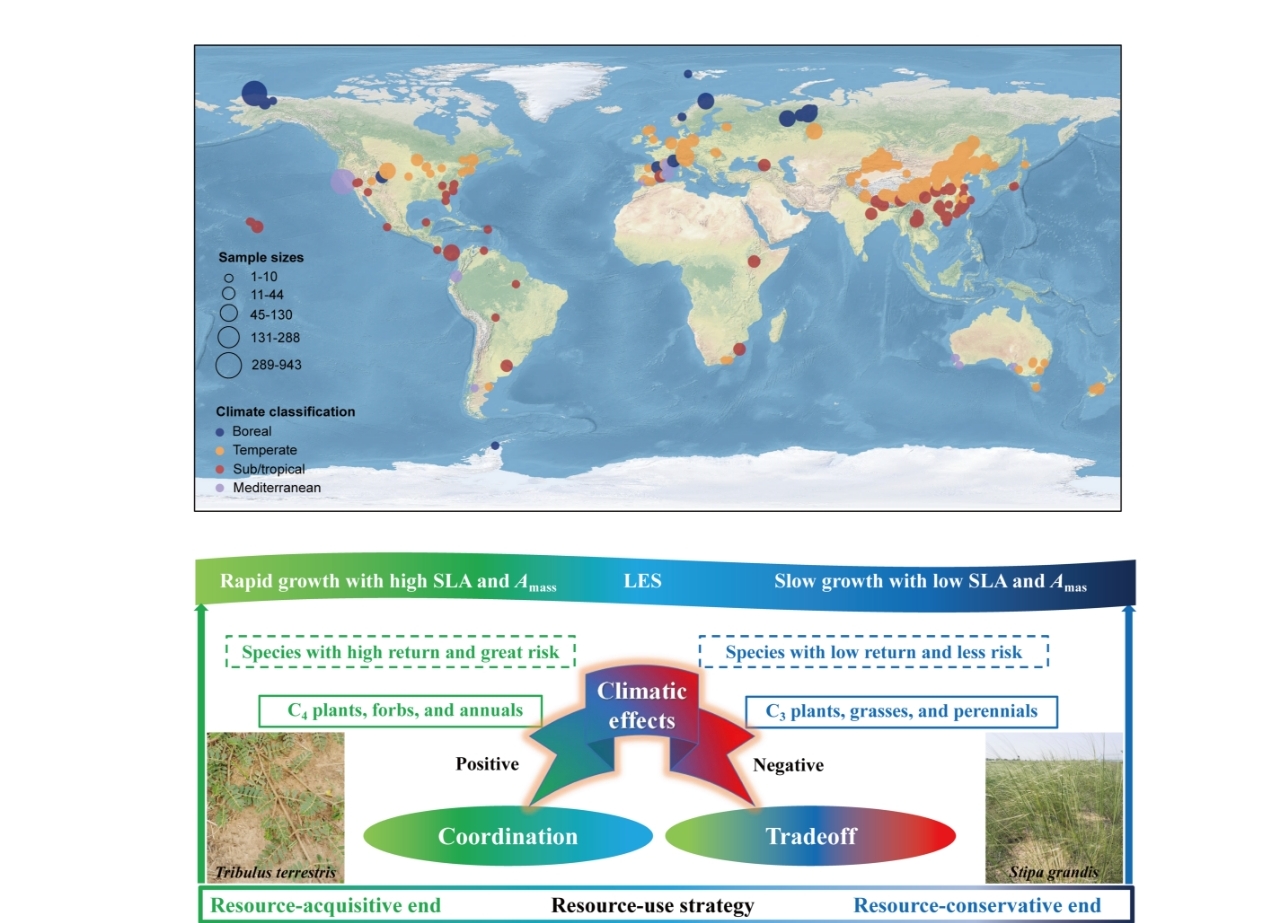A new study, published in Journal of Ecology, has revealed the patterns of trait covariation across global grassland species, highlighting that the trait coordination and trade-off of global grasslands—the largest terrestrial ecosystems globally—and pinpoints the climate variables that drive these patterns.
Led by Pro. XU Zhenzhu from the Institute of Botany of the Chinese Academy of Sciences, along with international collaborators, the researchers assembled 9,158 site-level records into the grassland leaf traits database to date. Across this global dataset, leaf traits and their inter-relationships shift markedly with climate zone and plant functional type.
Globally, C4 plants, forbs, and annuals follow a resource acquisition strategy. Plants in temperate climates tended to adopt a conservative strategy, whereas those in boreal, subtropical, tropical, and Mediterranean climates were more likely to employ a resource acquisition strategy. A clear conservative-acquisitive trade-off axis among functional traits was observed across global grasslands. Precipitation primarily drove the first axis of trait variation, reflecting the acquisition versus conservation of resources; temperature predominantly drives the second axis, linked to leaf nitrogen status.
The findings shows the strong global associations among plant functional traits, the pivotal role of plant functional types in mediating trait coordination and trade-offs, and their dependencies on climatic zones and environmental factors. These findings provide fundamental insights into the coordination and trade-offs of trait relationships at a global scale. As climate change and land-use intensification, understanding how plant traits co-vary and respond to environmental gradients becomes ever more critical. This study provides trait-based ecological understanding at the global scale and may inform projections of grassland functioning and resilience under future environmental scenarios.

Data sites with geographical coordinates across global grasslands (top) and a conceptual diagram illustrating relationships among plant functional traits (bottom). (Image by SUN Kuo)
A new study, published in Journal of Ecology, has revealed the patterns of trait covariation across global grassland species, highlighting that the trait coordination and trade-off of global grasslands—the largest terrestrial ecosystems globally—and pinpoints the climate variables that drive these patterns.
Led by Pro. XU Zhenzhu from the Institute of Botany of the Chinese Academy of Sciences, along with international collaborators, the researchers assembled 9,158 site-level records into the grassland leaf traits database to date. Across this global dataset, leaf traits and their inter-relationships shift markedly with climate zone and plant functional type.
Globally, C4 plants, forbs, and annuals follow a resource acquisition strategy. Plants in temperate climates tended to adopt a conservative strategy, whereas those in boreal, subtropical, tropical, and Mediterranean climates were more likely to employ a resource acquisition strategy. A clear conservative-acquisitive trade-off axis among functional traits was observed across global grasslands. Precipitation primarily drove the first axis of trait variation, reflecting the acquisition versus conservation of resources; temperature predominantly drives the second axis, linked to leaf nitrogen status.
The findings shows the strong global associations among plant functional traits, the pivotal role of plant functional types in mediating trait coordination and trade-offs, and their dependencies on climatic zones and environmental factors. These findings provide fundamental insights into the coordination and trade-offs of trait relationships at a global scale. As climate change and land-use intensification, understanding how plant traits co-vary and respond to environmental gradients becomes ever more critical. This study provides trait-based ecological understanding at the global scale and may inform projections of grassland functioning and resilience under future environmental scenarios.

Data sites with geographical coordinates across global grasslands (top) and a conceptual diagram illustrating relationships among plant functional traits (bottom). (Image by SUN Kuo)
